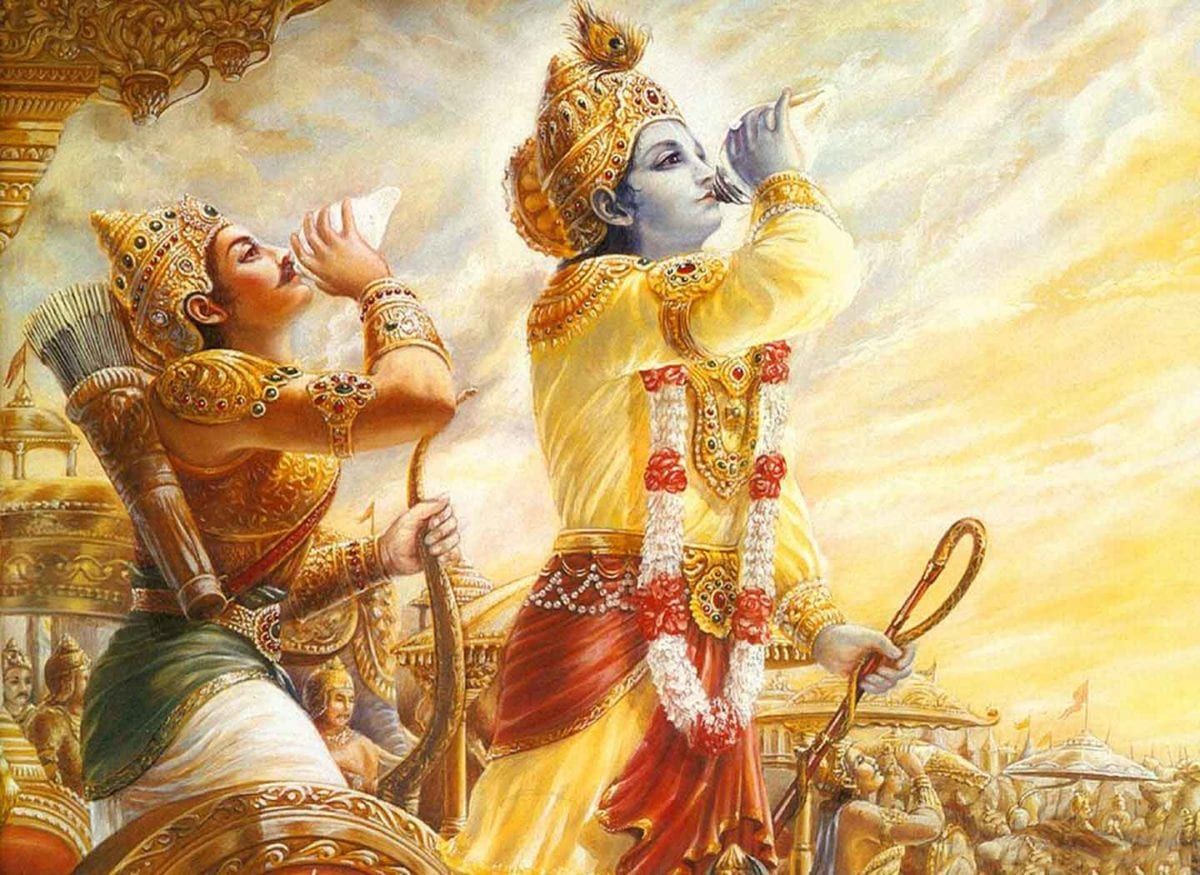Let me start with one of my favorite stories from the great epic, the Mahabharata. A story of faith and surrender, of destiny and divinity. This incident happened when legions of troops from all over the country were being mobilized to fight one of the bloodiest battles in the history of India – the great war of the Mahabharata between the Kauravas and the Pandavas that would last eighteen days.
The battlefield of Kurukshetra was being prepared to facilitate the movement of mammoth armies with large cavalries. Areas were marked for rival camps. Huge bundles of wood were organized to cook food for a sea of an army. Trees were being felled by elephants to clear the ground. On one such tree lived a sparrow, a mother of four young ones. As the tree was knocked down, her nest landed on the ground along with her offspring — too young to fly — miraculously unharmed.
The vulnerable and frightened sparrow looked around for help. Just then she saw Krishna scanning the field with Arjuna. They were there to physically examine the battleground and devise a winning military strategy before the onset of the war. She flapped her tiny wings with all her might to reach Krishna’s chariot.
“Please save my children, O Krishna,” the sparrow pleaded. “They will be crushed tomorrow when this battle starts.”
“I hear you,” said He, the omniscient one, “but, I can’t interfere with the laws of Nature.”
“All I know is that you are my savior, O Lord God. I rest my children’s fate in your hands. You can kill them or you can save them, it’s up to you now.”
“The wheel of Time moves indiscriminately,” Krishna spoke like an ordinary man implying that there wasn’t anything he could do about it.
“I don’t know any philosophy,” the sparrow said with faith and reverence. “You are the wheel of Time. That’s all I know. I surrender to thee.”
“Stock food for three weeks in your nest then.”
Unaware of the conversation, Arjuna was trying to shoo away the sparrow when Krishna smiled at the bird. She fluttered her wings a few times in obeisance and flew back to her nest.
Two days later, just before the conchs were blared to announce the commencement of the battle, Krishna asked Arjuna for his bow and an arrow. Arjuna was startled because Krishna had vowed not to lift any weapon in the war. Besides, Arjuna believed that he was the best archer out there.
“Order me, Lord,” he said with conviction. “Nothing is impenetrable for my arrows.”
Quietly taking the bow from Arjuna, Krishna took aim at an elephant. But, instead of bringing the animal down, the arrow hit the bell around its neck and sparks flew from it.
Arjuna couldn’t contain his chuckle seeing that Krishna had missed an easy mark.
“Should I?” he offered.
Again ignoring his reaction and question, Krishna gave him back the bow and said that no further action was necessary.
“But, why did you shoot at the elephant, Keshav?” Arjuna asked.
“Because this was the elephant that had knocked down the tree sheltering that sparrow’s nest.”
“Which sparrow?” Arjuna exclaimed. “Plus, the elephant is unhurt and alive! Only the bell has gone!”
Dismissing his questions, Krishna instructed him to blow his conch.
The war began and numerous lives were lost over the next eighteen days. The Pandavas won in the end. Once again, Krishna took Arjuna with him to navigate through the ruddy field. Many corpses still lay there awaiting their funeral. The battleground was littered with severed limbs and heads, lifeless steeds and elephants.
Krishna stopped at a certain spot and looked down thoughtfully at an elephant bell.
“Arjuna,” he said, “will you lift this bell for me and put it aside?”
The instruction, though simple, made little sense to Arjuna. After all, in the vast field where plenty of other things needed clearing, why would Krishna ask him to move an insignificant piece of metal out of the way? He looked at him questioningly.
“Yes, this bell,” Krishna reiterated. “It’s the same bell that had come off the neck of the elephant I had shot at.”
Arjuna bent down to move the heavy bell without another question. As soon as he lifted it though, his world changed forever.
One, two, three, four and five. Four young birds flew out one after another followed by a sparrow. The mother bird swirled in circles around Krishna, circumambulating him in great joy. The one bell Krishna had cleaved eighteen days ago protected the entire family.
“Forgive me, O Krishna,” said Arjuna. “Seeing you in a human body and behaving like an ordinary mortal, I had forgotten who you really were.”
I’ve always held that faith doesn’t mean life will go according to you. Instead, it means that you learn to get along with life. You recognize that life must run its own course. That your individual life is a tiny, albeit integral, part of the grand play of nature. An immensely grand play, at that.
Krishna had left the sparrow on the battlefield for it was destined to be there. The bird might have wished to have been in a safer place with her children. She might have argued with Krishna to take them with him. She might have begged that three weeks of food be provided to her. She didn’t do any of those. She simply followed the instruction and left it in the hands of the one she believed in. She didn’t forego the effort expected from her.
Many people see faith or surrender as a way to have their dreams come true. They believe that they’ll pray to some god and their wishes will be granted. This is not how nature operates. It can’t afford to, for we often wish for the wrong things. We keep desiring certain outcomes without realizing or understanding the cost of those desires. We forget that our choices are intricately linked to our fate, they shape our destiny. In wanting the ‘good’ stuff alone, we only see what we want to see.
Rather than aiming to be the person who can keep his or her partner happy, we wish for a person who will keep us happy, for example. And as we change, the things that made us happy earlier no longer do so. We then wish for another person, a better partner or something like that. Rather than being content with what we have, we crave more things. To acquire more things, we work harder, often at the cost of our health and relationships. Our quality of living may go up but the quality of life stands compromised and then we wonder how come more things are not making us happy.
Yes, you can grow a seedless melon but not a skinless one. Nature puts a protective covering on everything. Removing that layer can sometimes be tedious or messy, but without it, the fruit will perish before it even ripens. Some part of our lives will inevitably go into laboring to break the coconut before we can enjoy the tender inside.
Faith is not a tug-of-war between your desires and His grace (both of which are endless) hoping that one day you’ll lure God into playing unfair. On the contrary, it is letting go. It is raising your hands in surrender without giving up on your action. Faith is knowing that not every day out there will be sunny. And that’s okay. It is realizing that dawn will follow dusk. Faith is the awareness that a cloudy sky doesn’t mean the sun has set.
To work on everything that you can and to let go of everything beyond your control is faith in a nutshell. Such faith, made up of action and surrender, is the most potent antidote to all fears.
As Blaise Pascal said most beautifully, “The heart has its reasons, which reason does not know. We feel it in a thousand things.”
Faith is the heart’s wisdom. It’s what your mind can’t grasp but your heart knows. Give it a place in your life and you’ll fly with a thousand wings. Higher and swifter. Across the seas, beyond the skies.
Peace.
Swami
A GOOD STORY
There were four members in a household. Everybody, Somebody, Anybody and Nobody. A bill was overdue. Everybody thought Somebody would do it. Anybody could have done it but Nobody did it.
Don't leave empty-handed, consider contributing.It's a good thing to do today.









Comments & Discussion
34 COMMENTS
Please login to read members' comments and participate in the discussion.